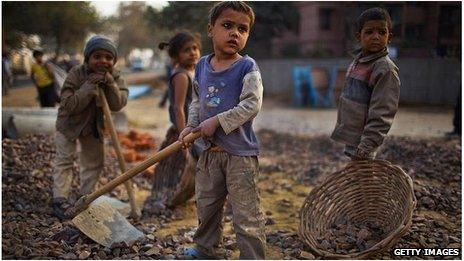US trafficking report reveals 'modern slavery' toll
- Published

The report aims to broaden understanding of "trafficking in people" to include adults and children forced into work or servitude
More than 42,000 adults and children were found in forced prostitution, labour, slavery or armed conflict in 2011, a US government report has found.
Some 9,000 more victims were identified around the world than in 2010, <link> <caption>the state department report said</caption> <url href="http://www.state.gov/j/tip/rls/tiprpt/2012/index.htm" platform="highweb"/> </link> .
But the number is just a fraction of the estimated 800,000 people trafficked across borders every year.
Conflict-wracked Syria was relegated to the category of worst offenders, while seven other states came off that list.
Syria's Middle Eastern neighbour Lebanon and Burma were among those judged to have improved their efforts to combat what the state department terms "modern-day slavery".
Syria was identified as a transit country for Iraqi women and girls, South East Asians and East Africans being trafficked for a life of prostitution in Europe, the Trafficking in Persons (TIP) report said.
In addition, thousands of women from several nations have been left working as forced domestic servants inside Syria as the conflict escalates.
At least 95 Filipina women remained trapped inside the cities of Homs and Hama at the end of 2011, the International Organization for Migration said.
Syria's government was making "no discernible effort" to identify and protect victims of trafficking, the report said, and could now be subject to US sanctions for dropping into the bottom tier.
'Unfinished war'
Describing the report as a "clear and honest assessment", US Secretary of State Hillary Clinton said: "The end of legal slavery in the United States and around the world has not meant the end of slavery."
Where the trade in persons was once labelled as human trafficking, Mrs Clinton said: "I think labelling this for what it is - slavery - has brought it to another dimension."
The stories of those enslaved "remind us of what kind of inhumane treatment we are still capable of as human beings. They are living, breathing reminders that the war against slavery remains unfinished."
The report ranks each of the world's nations for their compliance with US and global anti-trafficking laws.
Those laws are aimed at tackling a global trade in humanity that sees an estimated 20.9 million people living in modern-day slavery at any one time, according to a new estimate by the International Labour Organization.
Much of Western Europe and North America is regarded as "Tier 1" territory - countries whose governments fully comply with minimum standards for the elimination of trafficking.
But even top-tier nations face problems.
The US, which faces an ongoing <link> <caption>struggle with sex traffickers</caption> <url href="http://www.bbc.co.uk/news/world-us-canada-18144333" platform="highweb"/> </link> smuggling women into prostitution from Mexico and Latin America, saw government funding for anti-trafficking measures drop during 2011.
More money was needed for victim support, the report said, along with improved data analysis and identification services and a push to help businesses understand how to avoid employing victims of trafficking.
The report's overall emphasis on victim support and identification would be welcomed by those working in the US and overseas, one non-governmental organisation said.
"Treating victims as victims and not as criminals is important," said Bradley Myles of Polaris Project, a US-based anti-trafficking operation. "These are victims of crime with human rights and they should be protected."
'Systematic repression'
Seventeen nations - mainly in Asia and North and Sub-Saharan Africa - were placed in the lowest tier in the 2012 report.
Syria's entry to that groups places it with the likes of Cuba, Iran, North Korea and Zimbabwe in clear violation of anti-trafficking laws.
Other unstable nations, including Libya, Yemen, Sudan and DR Congo, remain in the group of non-compliers, as well as US military allies Saudi Arabia and Kuwait.
Burma climbed out of the bottom tier to a 42-nation-strong "watch list", the report said, mainly as a result of a new effort by its government to address forced labour and the conscription of child soldiers.
Lebanon made the fight against human trafficking a national priority, the report said, passing a new law that helped it climb a peg.
China and Russia remained on the "watch list", with the state department remarking that China continues to practise a "systematic form of repression" known as "re-education through labour".
Most countries on the list, 93, were ranked in Tier 2 - judged to be in breach of anti-trafficking laws but making notable efforts to end those breaches.
Among the countries promoted to Tier 1, Nicaragua made its first appearance, one that US anti-trafficking chief Luis CdeBaca said was evidence of a positive anti-trafficking trend in Latin America.
- Published7 June 2012
- Published3 April 2012
- Published9 February 2012
- Published1 February 2012